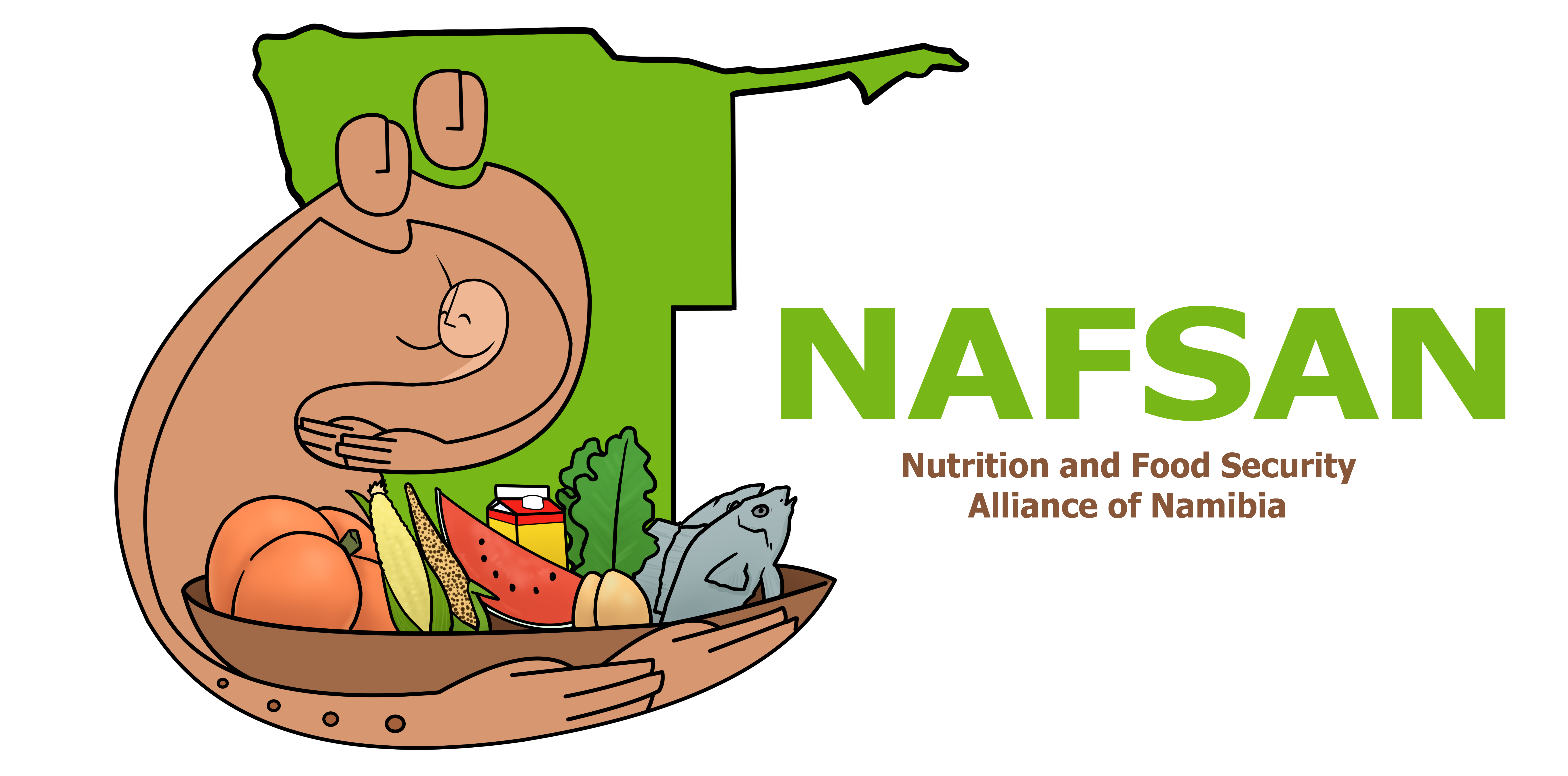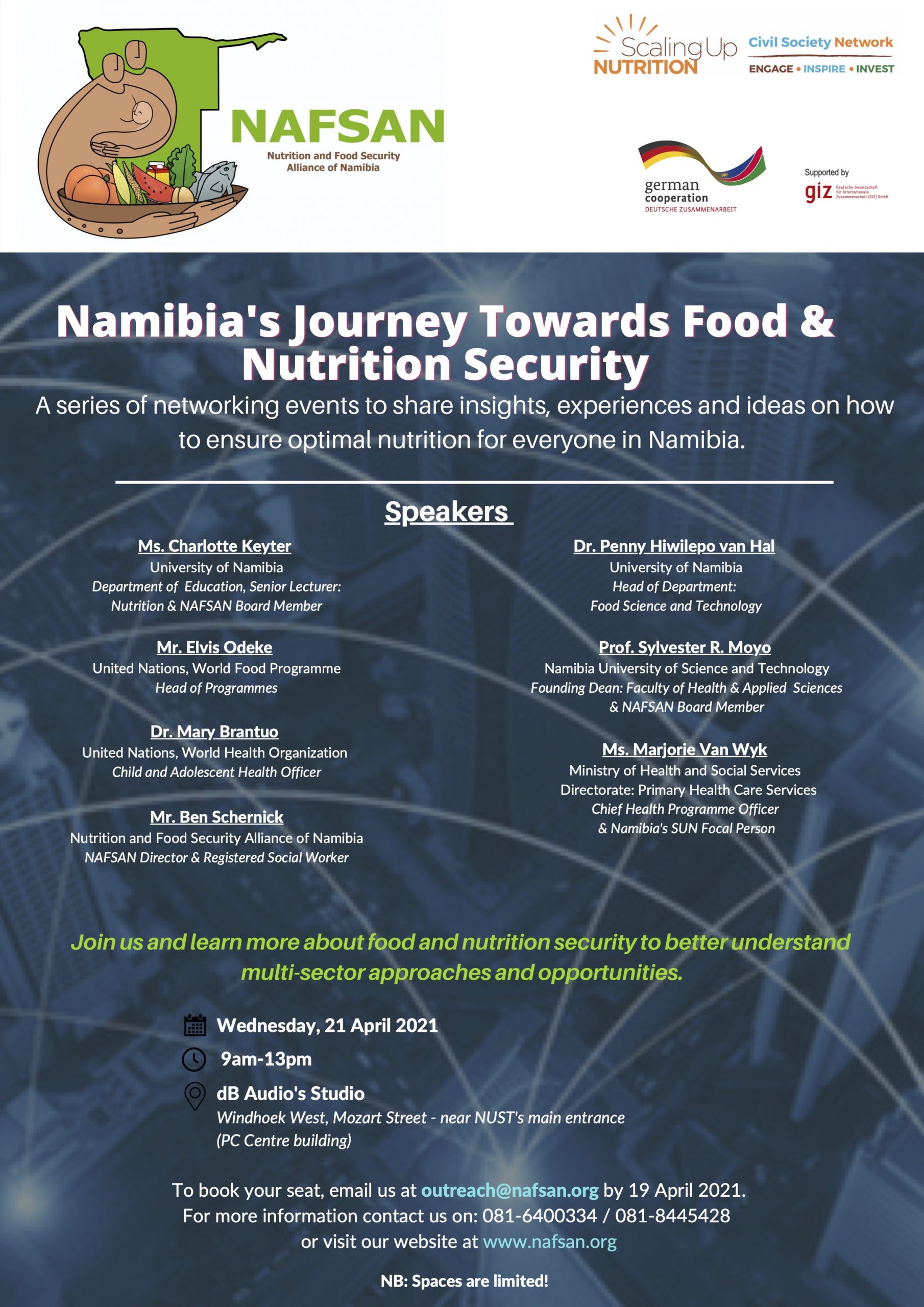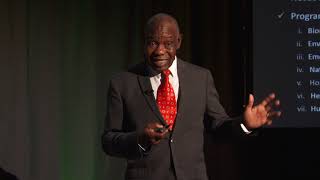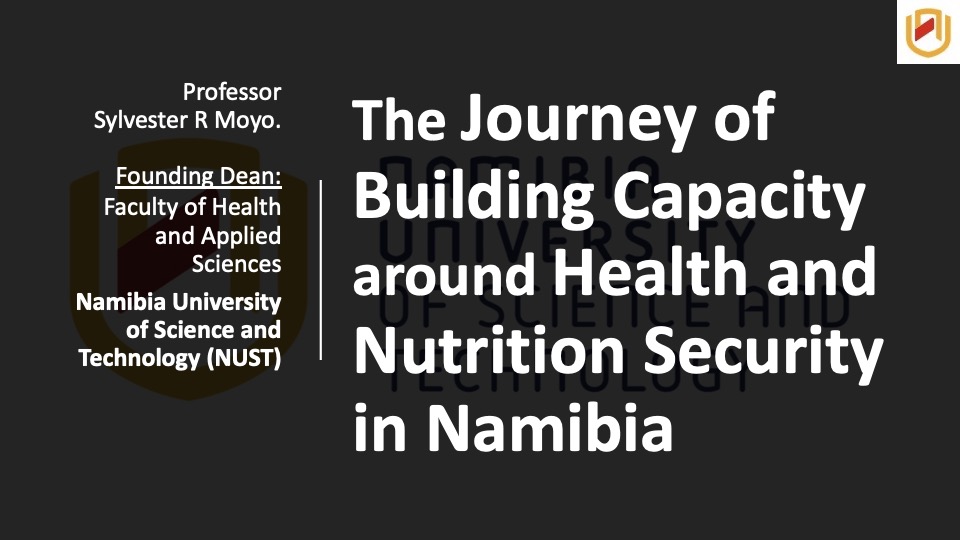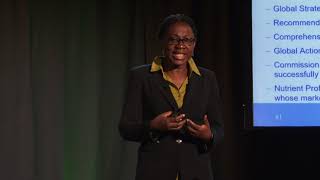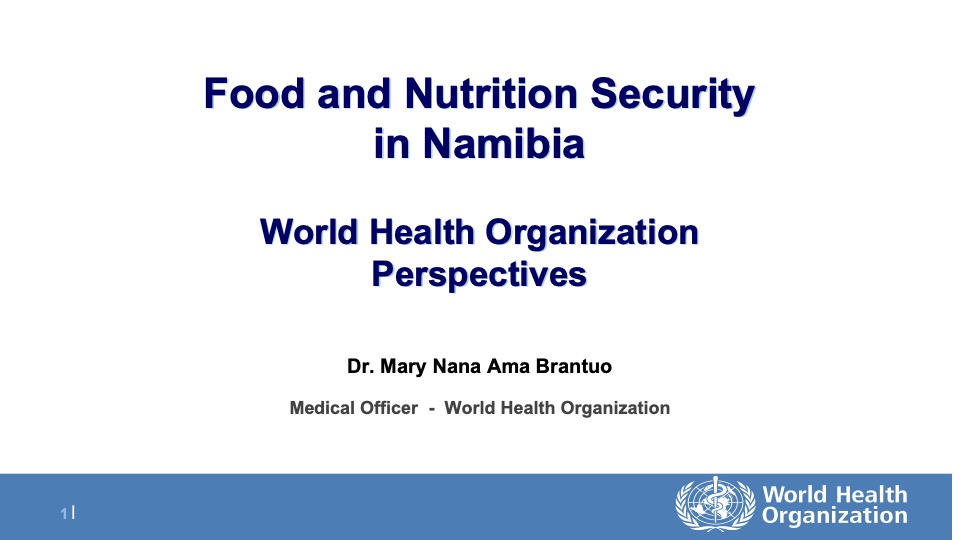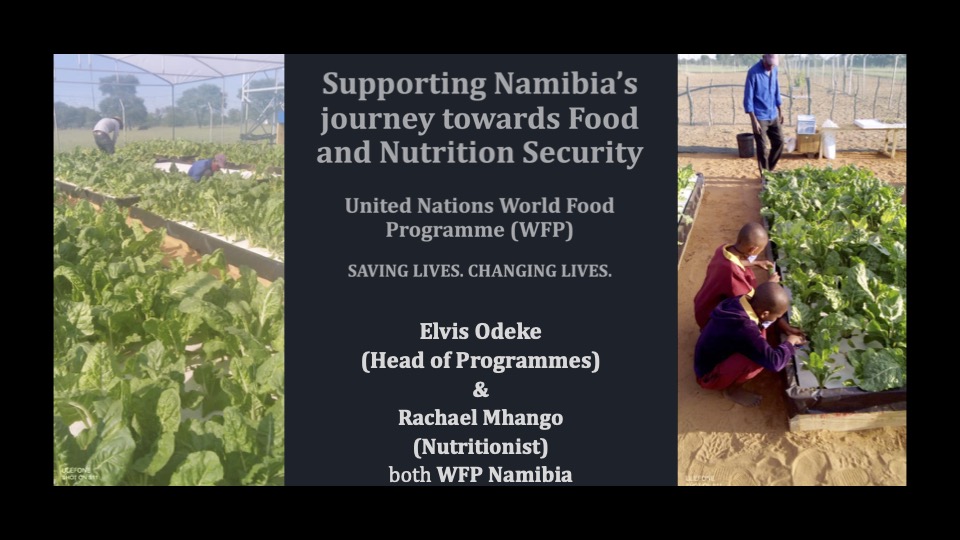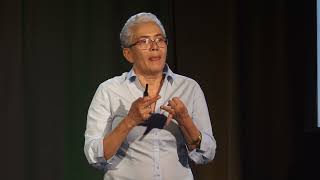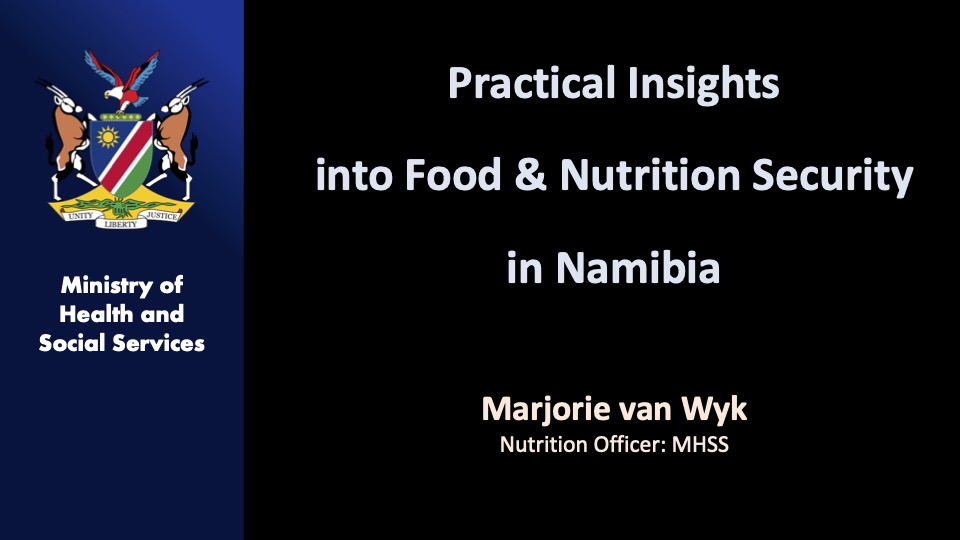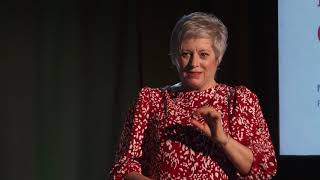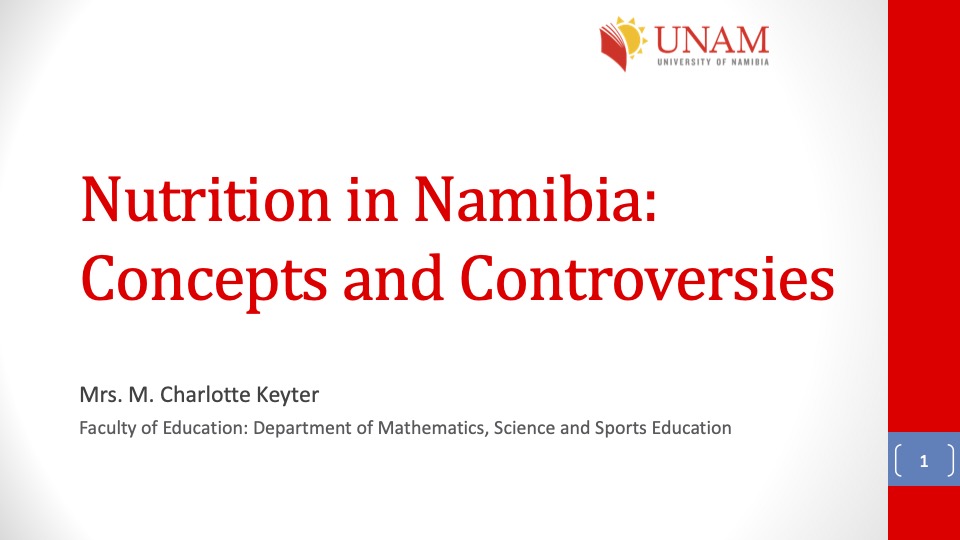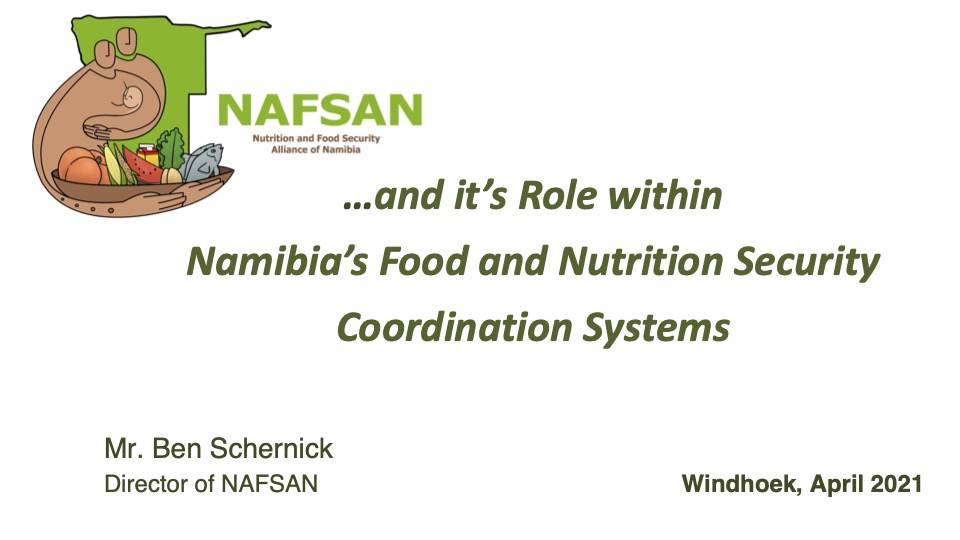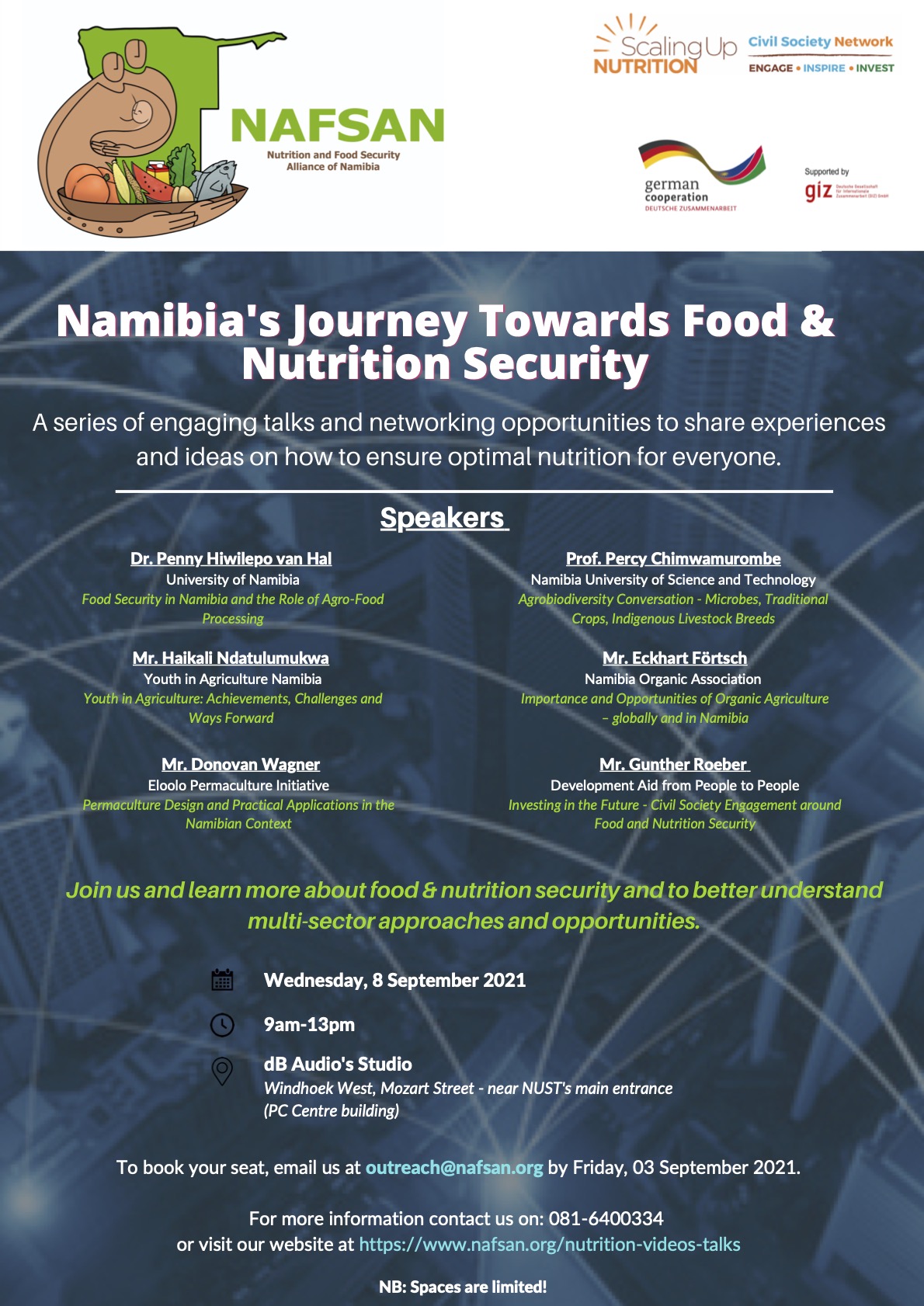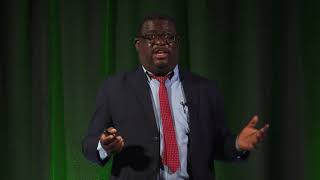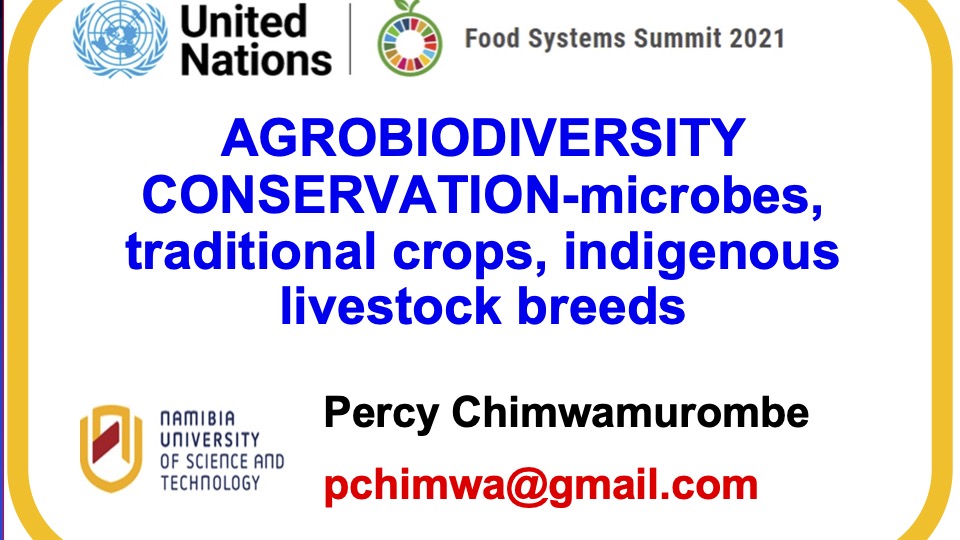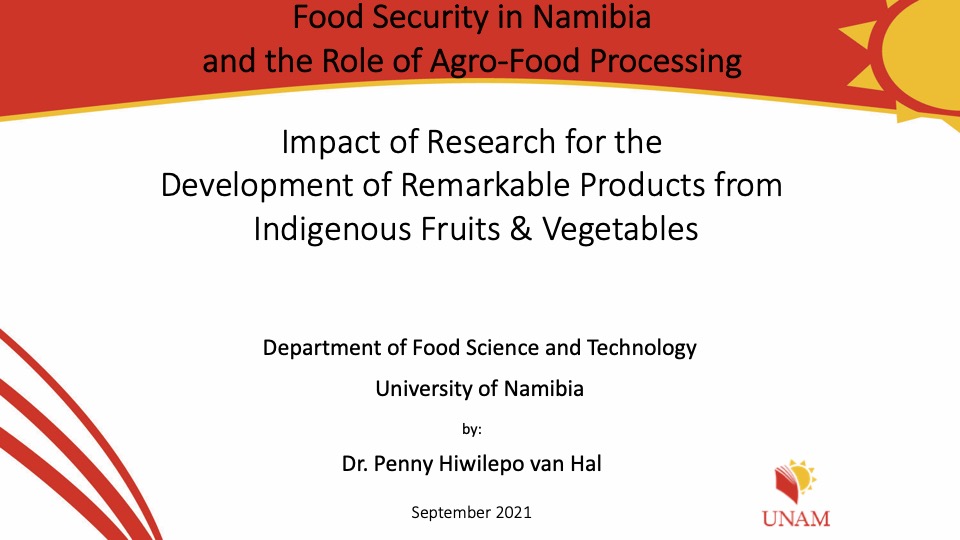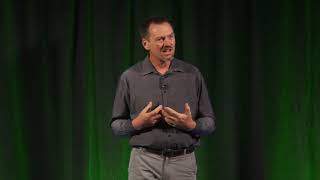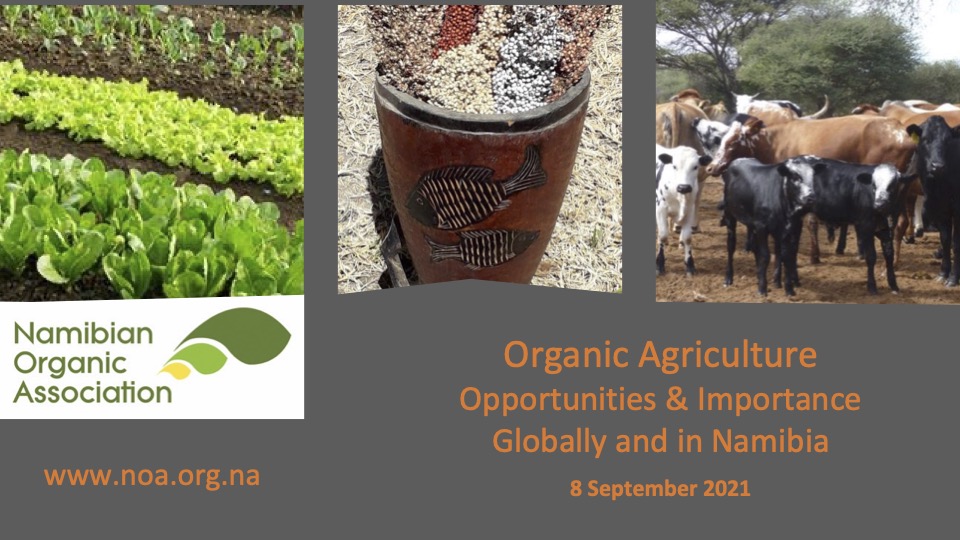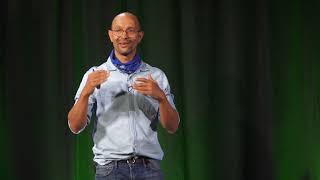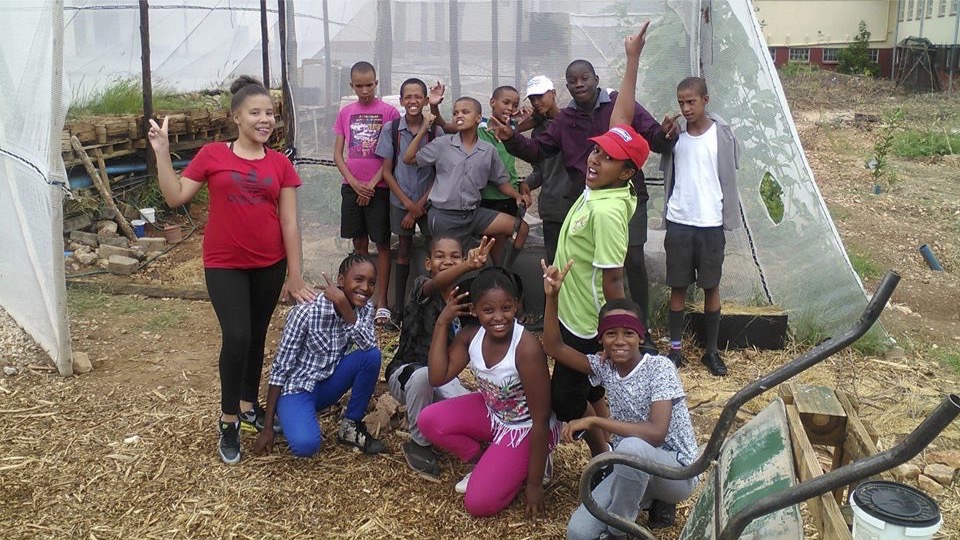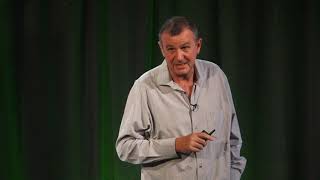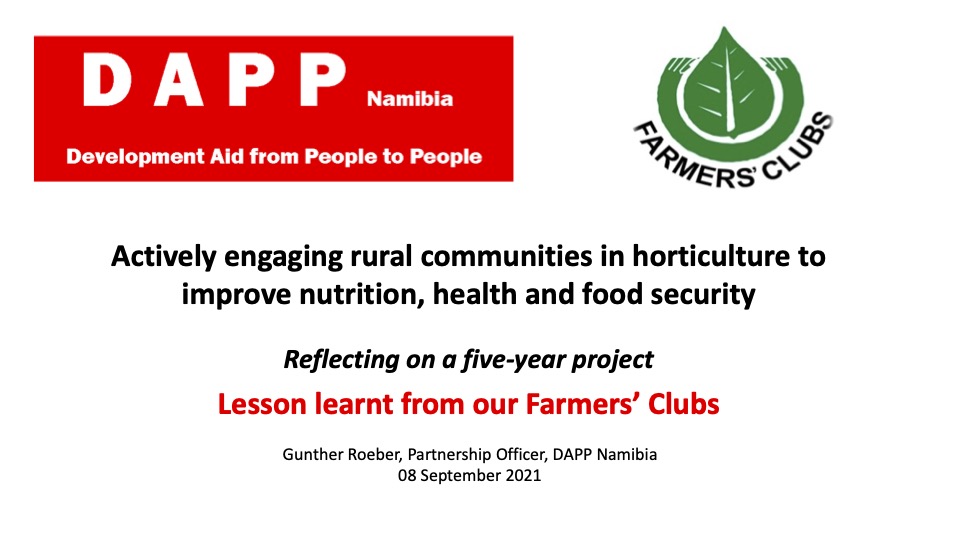Engagement Talks on Nutrition and Food Security in Namibia
Namibia’s Journey Towards Nutrition and Food Security
A series of engagement talks to share insights, experiences and ideas on how to ensure optimal nutrition and food security for everyone in Namibia
These talks form part of an emerging ‘video library’ on food and nutrition security in Namibia, and are meant to inspire others to actively engage in these important areas of development.
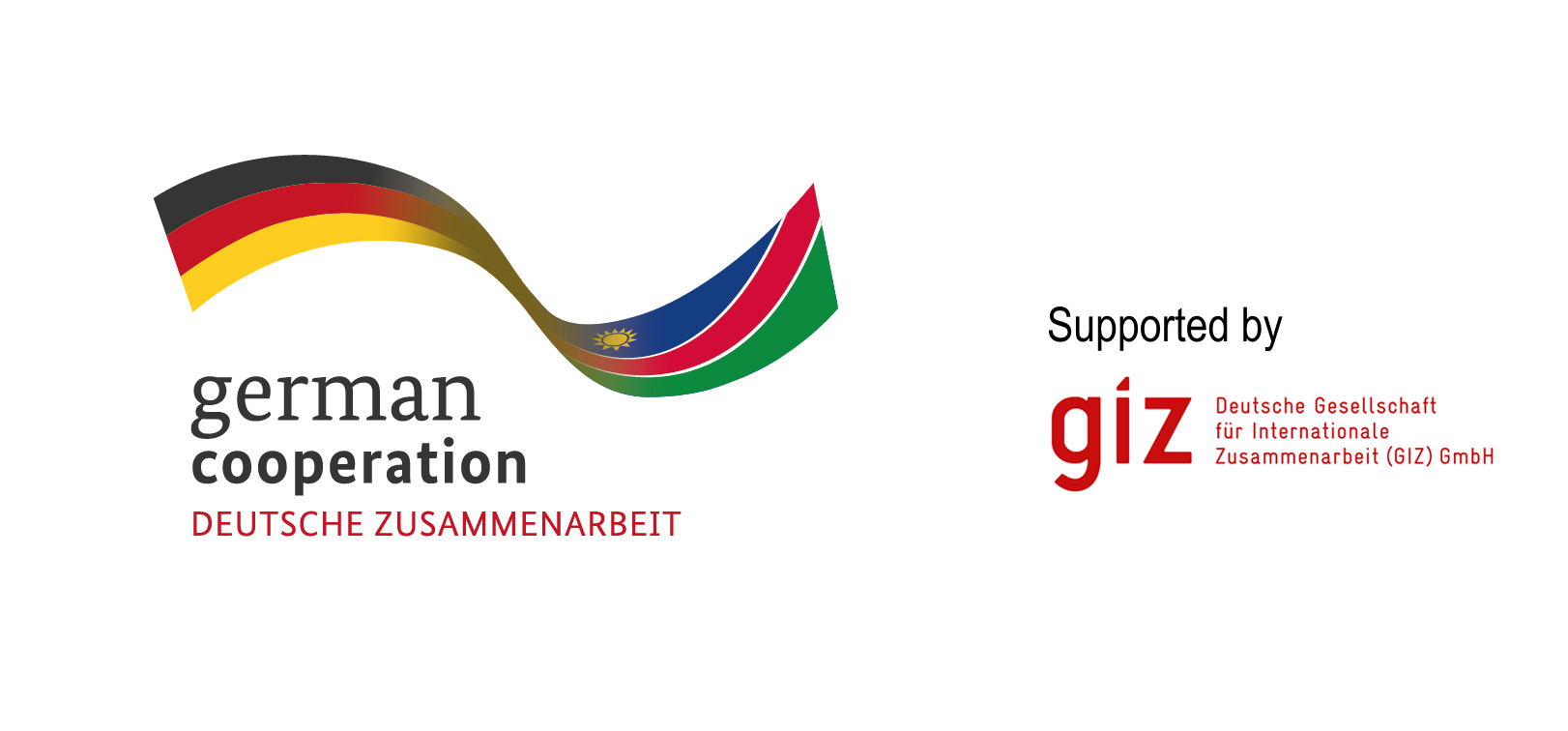
The first round of engagement talks was held on 21 April 2021 in Windhoek, and focused on Namibia’s Nutrition Situation and Interventions.
Six presenters from key Namibian Institutions and United Nations Organisations gave insights into their organisations’ efforts to overcome all forms of malnutrition, talking with profound passion and from a wealth of personal and professional experiences.
Journey of Building Capacity around Health and Nutrition in Namibia
by Prof. Sylvester R. Moyo, Namibia University of Science and Technology - ...CLICK HERE...
This talk by Prof. Sylvester R. Moyo from the Namibian University of Science and Technology (NUST) is part of: “Namibia’s Journey Towards Nutrition and Food Security" – A series of engagement talks to share insights, experiences and ideas on how to ensure optimal nutrition for everyone in Namibia.
On 21 April 2021, Prof. Moyo – founding Dean of the Faculty of Health and Applied Sciences at NUST and founding Board Member of NAFSAN, opened up the floor and gave a quick rundown on how programs under the new faculty started, with great emphasis on the Bachelor of Human Nutrition, which was initiated in 2017 with the help from UNICEF, WHO, WFP and the Namibian Ministry of Health and Social Services (MoHSS). The programme is also offered as an Honours degree, and he was particularly excited to announce that the university will be releasing their first cohort of nutritionists into the working environment as from this year!
As one of the significant future projects, he highlighted the envisioned Center of Excellence in Human Nutrition at NUST.
His talk was followed by an interactive session with comments and questions from the audience.
Food and Nutrition Security in Namibia, WHO Perspectives
by Dr. Mary Nana Ama Brantuo, World Health Organization (Namibia) - ...CLICK HERE...
This talk by Dr. Mary Nana Ama Brantuo from the United Nations’ World Health Organisation (WHO) in Namibia is part of: “Namibia’s Journey Towards Nutrition and Food Security" – A series of engagement talks to share insights, experiences and ideas on how to ensure optimal nutrition for everyone in Namibia.
On 21 April 2021, Dr. Brantuo, Child and Adolescent Health Officer at WHO Namibia, started off by providing a brief background of her own journey within the WHO. She then explained the WHO’s global role in, especially around universal health coverage, with the goal of ensuring that everyone will have access to health care services by 2023.
Dr. Brantuo further gave an overview of WHO’s 4 main priorities that help them achieve their goals:
- Advancing Universal Health Coverage,
- Addressing Health Emergencies,
- Promoting Healthier Populations, and
- Strengthening Leadership, Governance and Enabling Functions.
The importance of nutrition was strongly emphasized, as well as that it is very critical across all areas of health and development because it helps breaking the cycle of poverty and hunger. She then gave a quick description of the double- and triple nutrition burden globally before shifting the focus to past, present, and future interventions in Namibia.
She concluded by the stating the areas of engagement that still needs strengthening, such as creating more enabling policies, e.g., regulation of breastmilk substitutes and maternity support and protection.
Her talk was followed by an interactive session with comments and questions from the audience.
For more information, follow WHO Namibia on Twitter and check out their comprehensive information pages on:
Supporting Namibia’s Journey towards Food and Nutrition Security
by Mr Elvis Odeke, United Nations World Food Programme in Namibia - ...CLICK HERE...
This talk by Mr Elvis Odeke from the United Nations World Food Programme (WFP) in Namibia is part of: “Namibia’s Journey Towards Nutrition and Food Security" – A series of engagement talks to share insights, experiences and ideas on how to ensure optimal nutrition for everyone in Namibia.
On 21 April 2021, Mr Odeke, WFP Namibia’s Head of Programmes in Namibia, supported by his colleague Mrs. Rachael Mhangu (Nutritionist), explained WFP’s priorities and main focus on Sustainable Development Goal (SDG) No. 2: Zero Hunger, with WFP’s role and involvement in Namibia being defined by Namibia’s National Development Plans.
As the largest humanitarian agency fighting hunger worldwide, WFP reaches over 80 million people around the world with food assistance each year. A key approach hereby is to strengthen local economies by increasingly considering cash transfers that enable people to buy local nutritious food.
Mr. Odeke further explained that in Namibia, they work closely with the Ministry of Education, Arts and Culture around school feeding schemes, with a pilot around locally sourced food starting in a number of schools soon. WFP also works closely with the Office of the Prime Minister where they provide technical assistance and development aid to Namibia to improve responses to emergencies situations, such as droughts.
WFP Namibia is mandated to support government to achieve its goals by providing support to nutrition interventions, policies and programmes that for instance, include nutritious school meals and food fortification.
Mr. Odeke ended with highlighting the three pillars of food security: “Availability, Accessibility and Utilization", before (as from ±19min) eloquently facilitating an interesting and extended Q&A session with comments and questions from the audience.
Practical Insights into Food and Nutrition Security in Namibia
by Mrs Marjorie van Wyk, Namibian Ministry of Health and Social Services - ...CLICK HERE...
This talk by Mrs. Marjorie van Wyk, from Namibia’s Ministry of Health and Social Services who is also Namibia’s Focal Person for the global SUN Movement is part of: “Namibia’s Journey Towards Nutrition and Food Security" – A series of engagement talks to share insights, experiences and ideas on how to ensure optimal nutrition for everyone in Namibia.
On 21 April 2021, Mrs van Wyk, Senior Nutritionist and Chief Health Programme Officer within the Ministry’s Directorate Primary Health Care Services, shared her experiences of overseeing all nutrition-related interventions Namibia, where she deals a lot with community nutrition.
She elaborates on how Namibia is currently revising its Food and Nutrition Security Policy with two of the four objectives centering around overcoming malnutrition, specifically the prevalence of undernourishment and significantly reducing rates of stunting.
She explained the consequences of malnutrition with multiple practical examples and visuals. She touched on the three indicators (stunting, underweight & wasting) and particularly went into more depth regarding stunting in terms of definition, causes and consequences, hereby using a variety of graphs and images and to highlight the need for interventions, where she highlighted the link between malnourishment and lack of access to water and hygiene.
She also spoke on child mortality and stated that the most important and effective intervention to reduce child mortality is for mothers to breastfeed within the first hour of life and then to continue breastfeeding as long as they can.
She ended with an overview of micro-nutrient deficiencies and highlighted the need to take action around good nutrition.
Her talk was followed by an interactive session with comments and questions from the audience, and you can also follow Marjorie on Twitter.
Nutrition in Namibia: Concepts and Controversies
by Mrs Charlotte M. Keyter, University of Namibia - ...CLICK HERE...
This talk by Mrs Charlotte M. Keyter, from the University of Namibia is part of: “Namibia’s Journey Towards Nutrition and Food Security" – A series of engagement talks to share insights, experiences and ideas on how to ensure optimal nutrition for everyone in Namibia.
On 21 April 2021, Mrs Keyter, Nutritionist, Senior Lecturer, Head of Department: Physical and Sport Sciences at UNAM and founding Board Member of the NAFSAN, began by introducing the ten pillars of nutrition with special focus on adequacy, variety and balance.
“Eat a variety of food from all food groups”, she said and elaborated on this principle with a number of practical examples and great humour. Mrs Keyter further provided historical context, when right after Namibia’s Independence in 1990, she was part of the team that developed the Food and Nutrition Guidelines for Namibia through a highly participatory process. These guidelines were approved by Cabinet in 2000, yet they are still relevant today as they were recently also used by NAFSAN for information materials on ‘Food Safety and Nutrition during Covid-19’. Key messages in these food guidelines are, for instance, to eat a variety of foods, eat more fish, eat fruits and vegetables every day etc.
Her presentation concluded with the call for people to eat a balanced diet and less processed food. Her talk was followed by an interactive session with comments and questions from the audience.
NAFSAN's role within Namibia’s Food and Nutrition Coordination Systems
by Mr Ben Schernick, Nutrition and Food Security Alliance of Namibia - ...CLICK HERE...
This talk by Mr Ben Schernick, from the Food and Nutrition Security Alliance of Namibia (NAFSAN) is part of: “Namibia’s Journey Towards Nutrition and Food Security" – A series of engagement talks to share insights, experiences and ideas on how to ensure optimal nutrition for everyone in Namibia.
On 21 April 2021, Mr Schernick, Director of NAFSAN and Social Worker by profession, started by sharing insights about the four key aspects of nutrition:
- Maternal & Child Care,
- Food Agriculture & Diets,
- Health, Water & Hygiene, and
- Social Protection.
He then provided a brief historical background of Namibia’s initial food and nutrition-related coordination mechanisms, such as the initial Food Security and Nutrition Council, which was formed in 1995, together with its accompanying policy framework.
He further explained why in 2010 the National Alliance for Improved Nutrition (NAFIN) was established, and how the Nutrition and Food Security Alliance of Namibia (NAFSAN) evolved out of NAFIN in October 2019, parallel to the Namibian Government revising its Food and Nutrition Security Council, Policy and Implementation Action Plan.
Mr. Schernick further elaborated on the roles and functions of NAFSAN, as well as on envisioned member organisations, whereby he stressed that NAFSAN is not an implementing organisation but rather an alliance (or ‘umbrella organisation’) that focuses on providing technical support, advice, and advocacy, and creating platforms and opportunities for networking, as well as providing support to its members and the general public.
His presentation was followed by a very brief Q&A session.
To stay up to date, you can follow NAFSAN on Twitter and on Facebook.
The second round of engagement talks was held on 8 September 2021 again in Windhoek and focused on indigenous and sustainable food sources in Namibia.
Five presenters from leading Namibian academic institutions and civil society organisations shared inspiring ideas based on their own research and practical experiences, and provided invaluable food for thought for future actions.
Agrobiodiversity Conservation - Microbes, Trad. Crops & Indigenous Breeds
by Prof. Percy Chimwamurombe, NUST - ...CLICK HERE...
Prof. Percy Chimwamurombe, is a passionate Researcher and Professor of Biology, who serves as Deputy Head of the Natural and Applied Science Department at the University of Science and Technology.
In this talk, he makes a captivating and convincing plea for Agrobiodiversity Conservation in Namibia. His very practical examples highlight the importance of research on diverse indigenous food sources and the need for introducing home-grown organic fertilizers. He emphasizes on the importance of sustaining biodiversity to create a food-secure nation and advises that people get acquainted with indigenous grains and plants that are readily available for human consumption e.g., cow peas, marama beans, water lilies & bambara groundnuts.
Food Security in Namibia and the Role of Agro-Food Processing
by Dr. Penny Hiwilepo-Van Hal, UNAM - ...CLICK HERE...
Dr. Penny Hiwilepo-van Hal is a Researcher and Senior Lecturer at the University of Namibia. Her presentation focused on Food Security in Namibia and the Role of Agro-Food Processing. She first explained and then highlighted the importance of Agro-food processing. By giving plenty of practical examples, she demonstrated how Namibians can process nutritious indigenous foods to preserve and to market delicious and healthy products.
Her insights are based on years of work with many food science students who have developed several local products. She hereby stressed the importance of value addition in developing these products and how otherwise neglected local plants can be utilized and made into different products, such as soups and beverages. Her insightful talk brought to light the nutritious value and significance of indigenous fruits & vegetables, such as cow peas, moringa, mutete and many more.
Organic Agriculture - Opportunities & Importance, globally and in Namibia
by Mr. Eckhardt Förtsch, Namibia Organic Association - ...CLICK HERE...
Mr Eckhart Förtsch is a local organic farmer and chairperson of the Namibian Organic Association. In his presentation he illustrates how organic agriculture not only makes economic sense, but also enhances the environment and leads to better nutrition. For Namibia the challenges of climate change and drought, food and nutrition security for a growing population, as well as market constraints, are directly addressed by the real-world solutions that organic agriculture offers.
Permaculture Design & Practical Application in Namibia
by Mr. Donovan Wagner, Eloolo Permaculture Initiative - ...CLICK HERE...
Mr Donovan Wagner, a Permaculture Practitioner and one of the Directors at Eloolo Permaculture Initiative took the stage to talk about permaculture and its practical applications in Namibia.
He began by introducing the underlying design principles of permaculture, emphasising that it is not just a method for growing food but a way of life in terms of learning from and living with nature.
He gave several examples of how this approach had already been applied in Namibia and what would be important to take into consideration from a permaculture perspective, with envisioned ways forward definitely including the planting of many more trees for a variety of good and important reasons.
Donovan emphasised the need to build on and integrate traditional knowledge into any permaculture design approaches, whether it be for school gardens, rural or semi-urban farms (such as Farm Okukuna in Windhoek – ), urban backyard gardens, lodges, conservancies, or farms in commercial or communal areas.
He also shared some practical insights and experienced from NAFSAN’s ‘Urban Gardens for Nutrition’ project, which was recently implemented in collaboration with the Shack Dwellers Federation of Namibia.
Engaging Rural Communities in Horticulture to Improve Nutrition and Health
by Mr. Gunther Roeber, Development Aid from People to People - ...CLICK HERE...
Mr Gunther Roeber from the Development Aid from People to People (DAPP) is a Learning Facilitator for Agriculture and serves as the Partnership Officer at DAPP.
In his talk, he is providing thought-provoking insights into the 5-year community-based Farmers’ Clubs Project and how best rural communities could be engaged in agriculture to improve nutrition and food security on a household level. DAPP worked closely with farmers, particularly female farmers in securing land, sectioning it off and installing water pumps.
The project has largely addressed malnutrition and improved the nutritional situation in the participating communities. Many community members are now self-sufficient, participating in subsistence farming of fresh vegetables, thus improving their household food security and meeting their nutritional needs.
However, the presentation also highlights some key areas for improvement when working with rural communities, based on this project’s experiences. Gunther’s honest reflections sparks crucial and critical debate afterwards.

